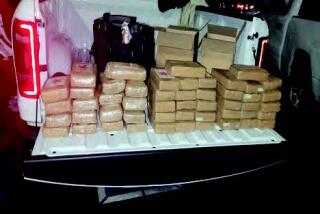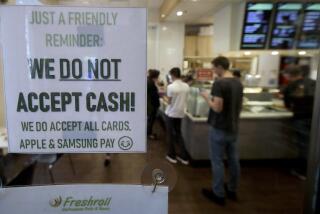Checkup on Cash Transfers
- Share via
The thousands of small storefront businesses cashing checks and wiring money will now have to register with the U.S. Treasury under rules aimed at tightening government controls on the laundering of illegal drug profits. Small fry, perhaps, but these mom-and-pop operations handle small-change transactions worth $200 billion a year, most of it legitimate. With the growing government oversight of banks, they have become the place of choice for drug traffickers, smugglers and various swindlers who need to launder their ill-gotten gains. Tracking criminals’ money is considered an effective tool in the government’s battle against drug trafficking. The new Treasury rules will help provide the paper trail.
Reliable data on illegal money laundering are, understandably, hard to get. But U.S. sources estimate that, worldwide, as much as $300 billion in illegal cash is being laundered each year.
The methods vary as the criminals try to keep a step ahead of the law. Financial services, such as wire transfers and bank drafts, are prevalent. To avoid regulations that require the reporting of money transactions exceeding $10,000, launderers increasingly break up large sums into small ones--a practice called smurfing--and process those through banks’ automatic teller machines or check-cashing and money-exchange or transmission operations.
Under U.S. laws, any such transactions handled through a bank account are required to be reported to the Treasury as a “suspicious activity.” Electronic money transfers and phony billing of legitimate trade in goods are also on the rise.
California has by far the largest share of the 160,000 or so check-cashing and money-wiring operations in the United States. The bulk of the cash is transferred legitimately. Most of the illegal activity takes place along the border with Mexico.
The new Treasury rules will require the check-cashing and money-wiring businesses, even those that are agents of the reputable Travelers Express, Western Union and Moneygram companies, to register. The Treasury Department hopes to establish a nationwide directory of illegal operations, making it easier to track them. Businesses issuing or redeeming money orders and travelers checks are also subject to the reporting requirements.
Undoubtedly, once the money services are subject to closer government scrutiny, crooks will seek another way of laundering their money. Already, law enforcement officials worldwide are detecting a rapid growth of electronic money and Internet transactions by money launderers. But the reporting rules will plug a gaping crack through which illegal money flows, and that’s worth the small reporting burden the new rules impose.
More to Read
Sign up for Essential California
The most important California stories and recommendations in your inbox every morning.
You may occasionally receive promotional content from the Los Angeles Times.













